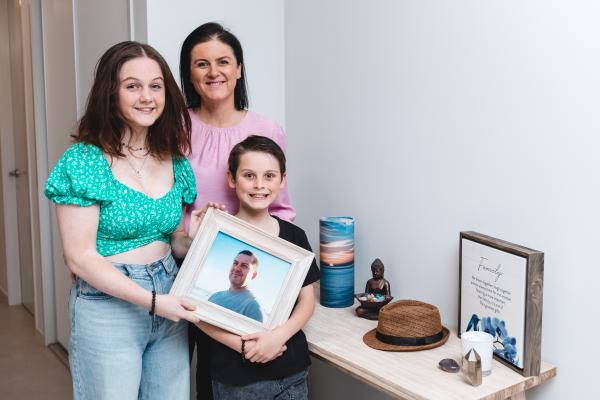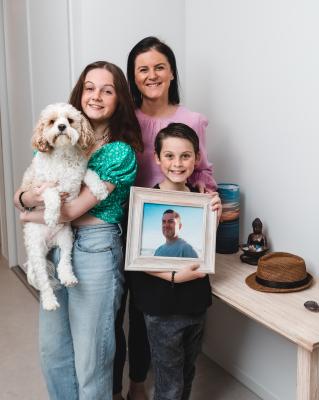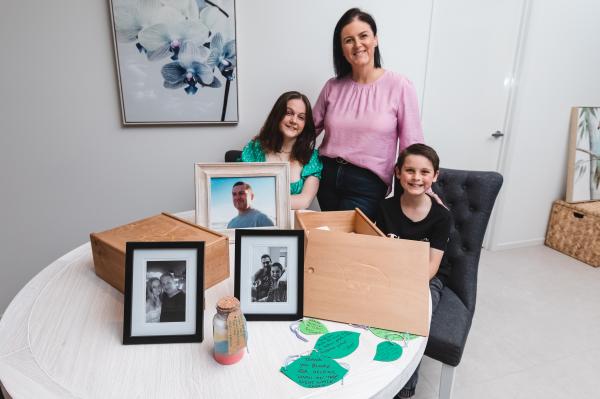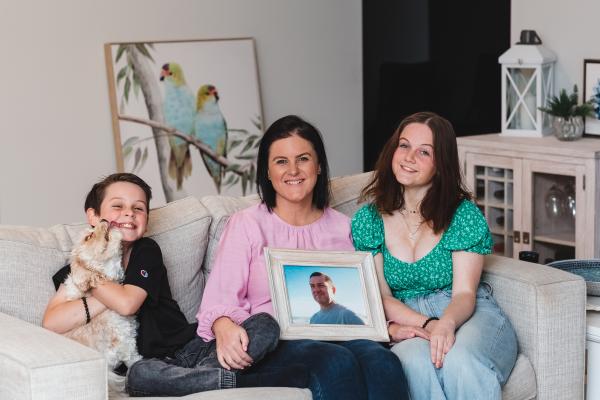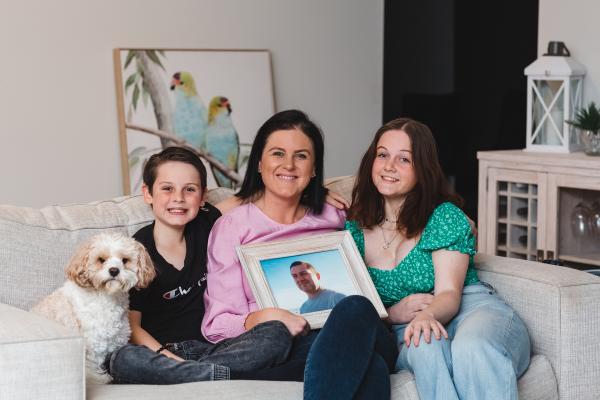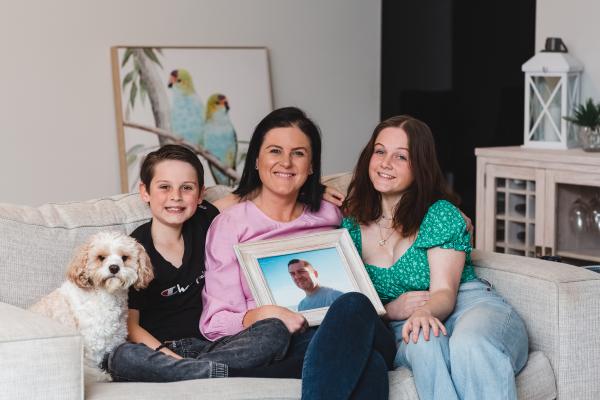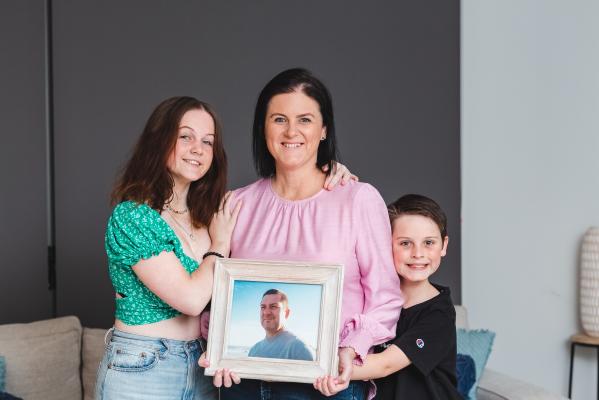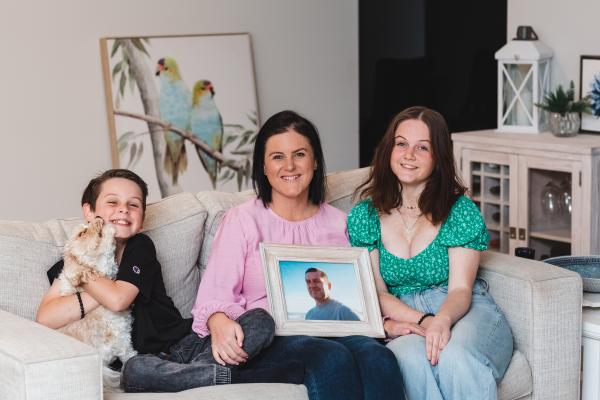
In 13 days James ‘Jim’ Larmour went from being a healthy, loving and “generous” father-of-two to succumbing to deadly infection in his heart.
More than a year later, his family speaks to Luke Voogt about connecting with others grieving lost parents and discovering they “are not alone”.
Blake Dyer-Larmour remembers his dad Jim as a “kind” and “very forgiving” man who always made time for him and older sister Tahra.
The Torquay 11-year-old fondly recalls riding the Ferris wheel at Adventure Park with dad on New Year’s Eve, 2019, and their trip to Sydney for his 10th birthday earlier that month.
“It was just me and him,” he said.
“We went jet boating and up Sydney Tower. It was really fun being up there with all the good views.”
Sadly, Blake is among the one in 20 Australians under 18 who have lost a parent or carer.
But more than a year since his dad’s death in January 2020, he is coping OK.
“I’ve been better since last year,” he said.
This March, he attended an Anglesea camp run by Drysdale-based children’s bereavement charity Wombat’s Wish, where he connected with other local kids who have lost a parent.
“I felt more comfortable talking to them than people who don’t know what I’m going through,” he said.
“It’s just knowing that … it’s not just us going through it.”
The camp helped Blake open up after Jim’s death according to Tahra.
“For ages he was very quiet,” Tahra, 16, said.
“He dealt with it himself and never really opened up about it.
“He did tell me that he felt a lot more comfortable opening up [at the camp]. I hadn’t seen him do that for ages.”
Tahra admits she was nervous and “not sure how I feel about this” prior to attending the camp.
“But as soon as I started talking, I felt so comfortable – everyone was really welcoming,” she said.
“It helped me realise that I wasn’t the only one going through what I was.
“There was no judgement. I could just open up to them about what I was feeling.”
Like Blake, Tahra remembers Jim as a father who put his children first.
“He just cared for everyone else before himself,” she said.
“We used to go on bike rides together after school.
“Every time he would do the groceries, he would take to buy me chocolates or lollies – because mum wouldn’t let him.”
Following the “blur” of Jim’s hospitalisation and death, Tahra was sad, angry and confused, especially after her grandparents (Jim’s parents) died in a car crash in April 2017.
“I saw it as, ‘why is this happening to me again?’” she said.
“I was denial for a really long time.”
Tahra came to terms with his death during 2020.
But the camp helped her “re-validate those things” with activities like a candlelight ceremony for loved ones.
“I learned that what I was feeling was OK – this has happened and it’s OK that it happened,” Tahra said.
“I knew that everyone there could relate to how I was feeling.”
Like her children, Jacqui Dyer-Larmour sometimes struggles with the suddenness of her husband’s death.
“Sometimes we wake up and wonder if it’s real,” she said.
“One moment someone’s fit and healthy and the next, they’re gone.”
On January 12, 2020, Jim woke up with flu-like symptoms but his condition deteriorated rapidly.
When he began shaking uncontrollably, Jacqui called an ambulance, which rushed him to hospital.
“It was actually quite traumatic for [the children],” Jacqui said.
“At first the infections unit didn’t know what they were dealing with.
“He was in an isolated room – the children had to be in full personal protective equipment (PPE) until they knew what it was.
“Putting the kids in gowns and masks … and them seeing their dad sick – it was pretty full-on.”
Once specialists diagnosed Jim’s golden staph (bacterial) infection, the children were allowed to see him without PPE.
Jim appeared to be healing, but on the 10th day specialists discovered some of the staph had lodged in his heart valve, after he complained of chest pains, and he underwent emergency surgery.
“He never woke from that,” Jacqui said.
“It was very up and down; even though he was weak, they were talking about him coming home.
“It was 13 days from being completely fine to gone.”
The family held a funeral for Jim before COVID-19 hit.
“But then we were alone at home to deal with it – when you want your friends and family around you the most,” Jacqui said.
“[Blake and Tahra] have been amazingly resilient and made me exceptionally proud.”
Last October, Jacqui discovered Wombat’s Wish. The bereavement charity was founded in 2005.
“I think there’s a lot of grief support out there for adults, but not children,” said Jacqui, who works in mental health.
“[Wombat’s Wish is] so fundamentally important and, unfortunately, I don’t think enough people out there know of them.”
But that seems likely to change, with Australian netballer Emily Mannix and Port Adelaide footballer Travis Boak, both of whom grew up in Geelong, recently becoming ambassadors for the charity.
“To go to a camp with people who completely get it, without judgement, is quite amazing,” Jacqui said.
“I’ve been very fortunate to have made a very close friend out of it.
“When you’re surrounded by people who just get it – it’s a place of feeling known and understood.
“You can actually talk openly about it – it’s not skirted around. The fact is dad’s died and it’s OK to say that.
“I think kids growing up can feel so alone in their thoughts – to know that they aren’t in this alone is just massive.”
Details: wombatswish.org.au


